 Petzlover
Petzlover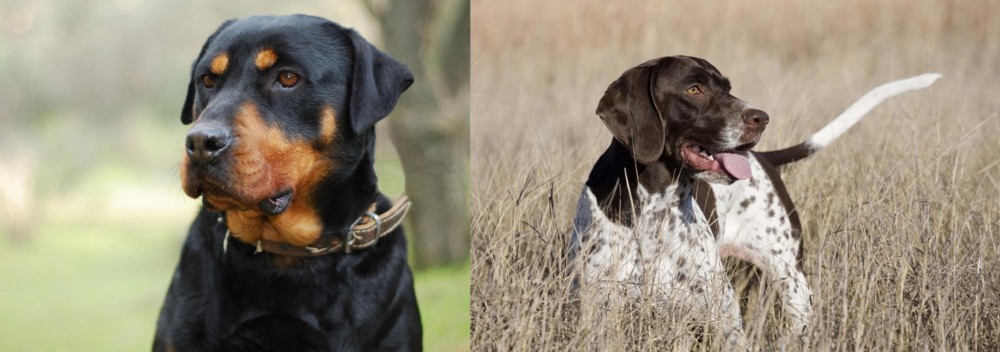 Rottweiler is originated from Germany but Old Danish Pointer is originated from Denmark. Rottweiler may grow 9 cm / 4 inches higher than Old Danish Pointer. Rottweiler may weigh 25 kg / 56 pounds more than Old Danish Pointer. Rottweiler may live 3 years less than Old Danish Pointer. Rottweiler may have more litter size than Old Danish Pointer. Both Rottweiler and Old Danish Pointer requires Low Maintenance.
Rottweiler is originated from Germany but Old Danish Pointer is originated from Denmark. Rottweiler may grow 9 cm / 4 inches higher than Old Danish Pointer. Rottweiler may weigh 25 kg / 56 pounds more than Old Danish Pointer. Rottweiler may live 3 years less than Old Danish Pointer. Rottweiler may have more litter size than Old Danish Pointer. Both Rottweiler and Old Danish Pointer requires Low Maintenance.
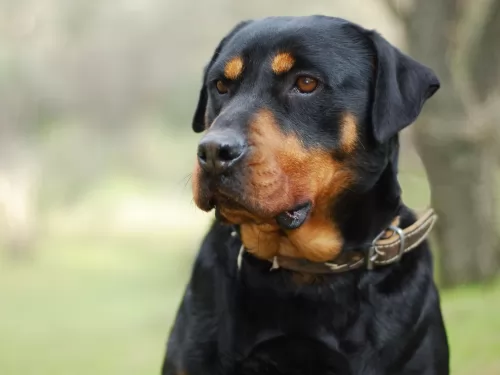 It is beleived to be the Rottweiler has been developed from the Roman cattle dogs. The Roman empire made a camp in a place at Germany in 74 AD. The area was called as 'das Rote Wil' and later as 'Rottweil'. In the middle ages Rottweiler was used in bear hunting and as a cattle dog. In 1899 the International club for Leonbergers and Rottweiler dogs was formed in Germany. In 19th century due to set in of railways the cattle was moved by railways and the need for the breed declined. When the world war was set in there came a heavy demand for police dogs. Rottweilers played a major role in first and second world war.
It is beleived to be the Rottweiler has been developed from the Roman cattle dogs. The Roman empire made a camp in a place at Germany in 74 AD. The area was called as 'das Rote Wil' and later as 'Rottweil'. In the middle ages Rottweiler was used in bear hunting and as a cattle dog. In 1899 the International club for Leonbergers and Rottweiler dogs was formed in Germany. In 19th century due to set in of railways the cattle was moved by railways and the need for the breed declined. When the world war was set in there came a heavy demand for police dogs. Rottweilers played a major role in first and second world war.
In 1921 many German Rottweiler clubs joined together to form ADRK, which is Allgemeiner Deutscher Rottweiler Klub. This is said to be the home club of Rottweiler. American kennel club recognised them in 1931. They become 9th most popular breed in America in 2013.
 Hailing from Denmark, the Old Danish Pointer originates back to 1710 and has been used as a pointing breed for finding game.
Hailing from Denmark, the Old Danish Pointer originates back to 1710 and has been used as a pointing breed for finding game.
Today they are essentially used as pet companions. Morten Bak mated local farm dogs with gypsy breeds, leading to the development of piebald purebred dogs. These were named Old Danish Pointers.
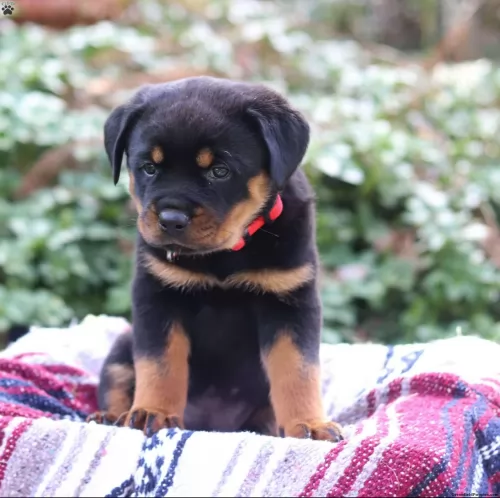 Rottweilers are good natured, obedient and are very much eager to work. They are calm, confident and an excellent watchdog. They will not make friends immediately. Rottweilers can be said as an all purpose dog since they are suitable as companion and watch dog as well. He is good in herding and guarding as genital feature. Rottweiler must be trained from its younger stage and should not be hit while training. They have high energy level and thus they are interested in doing work if properly trained. There are more possibilities of biting the strangers because of watchdog tendency.
Rottweilers are good natured, obedient and are very much eager to work. They are calm, confident and an excellent watchdog. They will not make friends immediately. Rottweilers can be said as an all purpose dog since they are suitable as companion and watch dog as well. He is good in herding and guarding as genital feature. Rottweiler must be trained from its younger stage and should not be hit while training. They have high energy level and thus they are interested in doing work if properly trained. There are more possibilities of biting the strangers because of watchdog tendency.
They are very good in herding sheeps as they have a natural gathering style. They are clever and adjusts the barking sound according to the situation. While herding they used to prove the leadership by selecting the dominant one in the flock and challenging it. If they were made to watch a same flock of cattle regularly, then they will develop a bond with them and will be affectionate with them as long as the cattle obeys its commands.
 The Old Danish Pointer is a medium-sized, purebred dog standing at between 50 and 60cm in height and weighing between 26 and 35kg.
The Old Danish Pointer is a medium-sized, purebred dog standing at between 50 and 60cm in height and weighing between 26 and 35kg.
This beautiful dog is muscular and lean with a broad head, floppy ears and a long thin tail. The coat is smooth and short haired and is white with large reddish brown patches as well as some freckling.He is an average shedding dog.
He has dark brown eyes. He is amicable and gets on well with children in the home as well as with other dogs. Even so, it is best to have him trained and socialized as he becomes obedient and more amicable than he already is. If you decide to go in for breeding your dog, you can expect 4 to 6 puppies.
Quiet, calm and steady, the Danish Pointer is also stubborn, and this is why training and socialization is so important for him.
Outdoors and perhaps on a hunt he becomes highly animated and alive, but back home with his family he is a calm, loving, devoted family pet and loves spending time with his human family. He forms a close bond with his human owner and when he is well trained, he likes to please his owner.
He is intelligent too and finds learning new things easy.
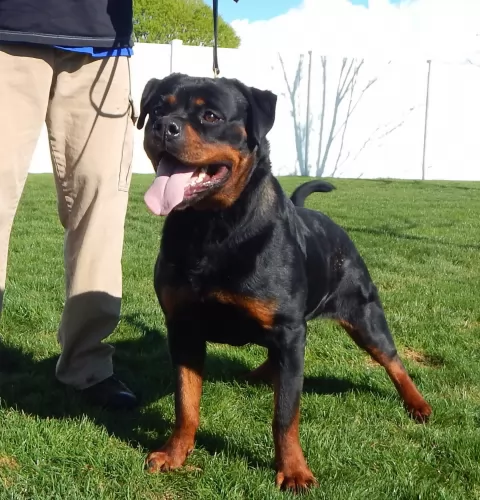 They are friendly with children and enjoy the company with them. But it is not advised to leave them with children without adult supervision.
They are friendly with children and enjoy the company with them. But it is not advised to leave them with children without adult supervision.
Rottweilers do not make friends immediately but take time to know about new people. He is an excellent watchdog. Males are quiet in nature but are watchful and females are more affectionate and obey some more. A good training is required for them to obey your orders.
They are not good for apartment life and thus a fenced back yard will be better for them to play and spend the energy. They require companion and will be happy to walk around with you. Hot weather will be some what better for them when compared with cold.
Rottweilers are easy to train because of their high intelligence. The training should be started in their young stage to have best results. They should not be dominated but treated kindly with understanding. They should be comfortable with the surroundings and people. Giving him a reward for training will make him interested in doing it. If he does a mistake then he should not be hit, so that he may get fear and loss his interest in doing it. Punishments will never work for them but rewarding will make him encouraged. Simple commands such as sit and stand shall be taught to them.
 Not only is the Old Danish Pointing Dog an excellent hunter, he is also friendly and loving when he is just being a pet.
Not only is the Old Danish Pointing Dog an excellent hunter, he is also friendly and loving when he is just being a pet.
These dogs are quiet, amicable pets enjoying the time they spend with their human family. He is low maintenance, he gets on well with children and other pets and he doesn’t spend his time barking endlessly at nothing.
When you take this well mannered, quiet, loving dog into your home, you can be prepared to have up to 14 brilliant years of companionship from him.
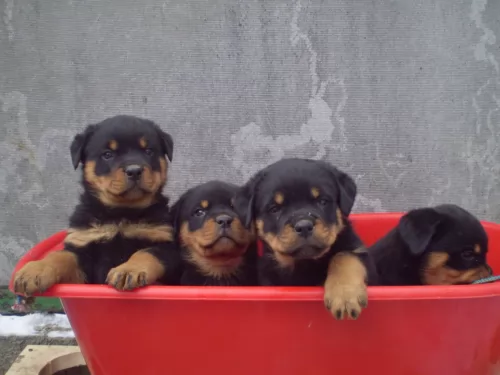 The health issues affecting the eyes of them are Cataract and Progressive Retinal Atropy. Health problems common in their joints are Hip Dysplasia, Elbow Dysplasia and Panosteitis. They also have chances to get circulatory system problems like Aortic Stenosis and Von Willebrand's Disease. Other common health problems in Rottweiler are Bloat and Cancer.
The health issues affecting the eyes of them are Cataract and Progressive Retinal Atropy. Health problems common in their joints are Hip Dysplasia, Elbow Dysplasia and Panosteitis. They also have chances to get circulatory system problems like Aortic Stenosis and Von Willebrand's Disease. Other common health problems in Rottweiler are Bloat and Cancer.
Mostly people think that Rottweilers don't shed but they are short haired dog and sheds more. They are having double coat that is undercoat and topcoat. The undercoat is softer and protects them in winter and topcoat is rougher and visible. It is said that they will shed in spring and winter seasons. Shedding can be reduced by brushing them.
 The Old Danish Pointer is a healthy dog and you’re not likely to be spending too much time at the vet with him.
The Old Danish Pointer is a healthy dog and you’re not likely to be spending too much time at the vet with him.
However there are always dog illnesses that you need to look out for, and hip dysplasia is always on the top of the list.
While this disease is more prevalent in larger dogs, it can strike smaller dogs too, and in fact dogs of any age. This is a condition where the hip joint doesn’t form properly, so that arthritis and inflammation sets in. It is very sad as you notice your once active dog becoming increasingly immobilized with pain and discomfort.
Eye infections can include entropion and ectropion – conditions where the eyelids irritate the surface of the eye.
Ear infections too, can cause your pet a lot of distress and he will shake his head and scratch his ears. Inside the ears, it will be red and possibly there will be a discharge. This is also more prevalent among dogs with floppy ears. The idea is to try and keep the inside of the ears clean and dry.
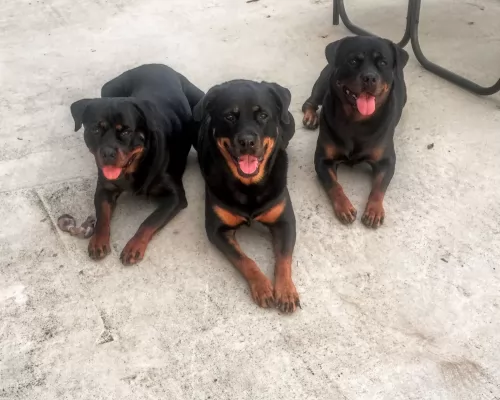 Rottweiler puppies should be given a diet which has protein, carbohydrates and fats. They need different diets in their growing stages. They can be given chicken with bones and vegetables for 4 days in a week. Beef with vegetables can also be given. When feeding them red meat a raw meaty bone can also be included. Fish oil can be given such that starting with 1000 mg and making it to 3000 mg in a time of two weeks.
Rottweiler puppies should be given a diet which has protein, carbohydrates and fats. They need different diets in their growing stages. They can be given chicken with bones and vegetables for 4 days in a week. Beef with vegetables can also be given. When feeding them red meat a raw meaty bone can also be included. Fish oil can be given such that starting with 1000 mg and making it to 3000 mg in a time of two weeks.
High calories of protein should be provided to them to meet their energy requirements. While buying commercial food it should be checked for the main ingredient to be meat. Protein levels should be more from animals than vegetables. High quality dairy products should be included. Food should not have low quality flavours and preservatives. Healthy fat is necessary for their skin and coat. If these fats are not provided it will cause dandruff and itchy skin.
Brushing them weekly once is recommended for their coat and skin. Buying the puppy from reputable breeder will be better. Vaccinations and preventive medicines should be given on right time. Spaying and Neutering should be done to avoid unwanted pregnancy. High quality diet should be maintained. Making them to bath once in a week is advisable. Nails should be trimmed once in every two weeks.
Rottweilers like to chase something and Laser pointer will be a good game for them. It will make them busy and also entertain us. But it should be on a limit and they should not get bored. A treat or toy can be hided and they can be made to find it. A bottle should be filled with water and frozen. The frozen bottle can be given to them for playing. In summer time it will make them very happy to play with it. A ball or toy can be thrown and they can be made to fetch it. Walking them is also a good exercise.
 With his short coat, the Old Danish Pointer is looked upon as a low maintenance breed. You can brush him twice a week and at the same time check him over for fleas and ticks, ear and eye infections as well as dental infections.
With his short coat, the Old Danish Pointer is looked upon as a low maintenance breed. You can brush him twice a week and at the same time check him over for fleas and ticks, ear and eye infections as well as dental infections.
Check his nails too, as many dogs have been injured when their long nails have hooked onto things and ripped open the flesh. When he gets used to it, your pet will find these grooming sessions therapeutic and relaxing, loving the bonding time you spend with him.
Your beautiful Old Danish Pointer loves to spend time outdoors and he is far better suited to life in the countryside and in the suburbs as opposed to life in the city. Give him the chance to take part in a hunt, and he’ll relish it. He also loves long walks where he can even perhaps be let off the leash as well as the chance to go swimming. He is at his happiest when he is tired at the end of the day from hiking, running, swimming and camping.
You can conveniently feed your Old Danish Pointer from the top quality commercially manufactured foods. Just be sure to check the labeling as you want to be sure he gets in the right amount of vitamins and minerals and avoids those foods high in colorants, preservatives and useless fillers.
Keep your dog’s diet simple and nutritious and try to add in some homemade food to his kibble from time to time. Boiled chicken, brown rice or pasta and some cooked vegetables such as sweet potatoes, spinach and carrots will keep him healthy and active. You can also try to include some raw meat occasionally.
Make sure he always has access to cool, fresh drinking water.